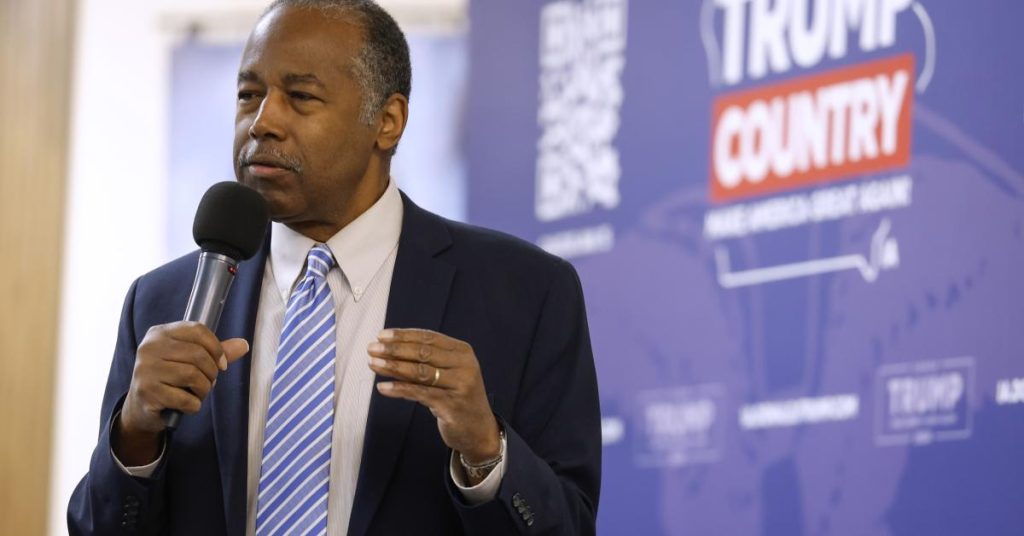Trump says he will award Presidential Medal of Freedom to Ben Carson
President Trump announced he will present the Presidential Medal of Freedom to Dr. Ben Carson, a move that spotlights a conservative life story and legacy many on the right admire. The announcement came at an event tied to the American Cornerstone Institute, the group Carson founded, and it carries symbolic weight beyond a single ceremony. This is recognition from a Republican president for a fellow conservative who transitioned from medicine to politics and faith-based leadership.
“We are going to be presenting Dr. Ben Carson with the highest civilian award and honor in our country. It’s the civilian version of the Medal of Honor, which is our highest military award. It’s the Presidential Medal of Freedom,” Trump said at the event, using phrasing that frames the award as the civilian peak of American honor. The comment lands as both praise for Carson and as a public affirmation of conservative achievements in civil society.
Trump also said he plans to hold a White House ceremony for Carson, signaling a formal and public celebration rather than a private nod. The timing and setting matter to Republicans who value visible recognition of conservative leaders who have shaped policy and public discourse. A White House ceremony is a platform to cement the narrative that conservative public service is patriotic and worthy of national honor.
“Congratulations, Ben,” Trump added. “He didn’t know this. He didn’t know it. I hope he’s happy.” Those lines were short and personal, a moment of warmth that plays well with a base that rewards loyalty and mutual support among conservatives. It also humanizes a formal award by showing the president’s personal appreciation for Carson’s service.
Ben Carson is first known to most Americans as a pioneering neurosurgeon whose childhood rise from poverty to professional success is often held up as a classic American story. He later entered politics, running for the Republican nomination in 2016 and ultimately serving as Secretary of Housing and Urban Development during Trump’s first term. Carson’s career blends professional accomplishment, faith-based rhetoric, and government service, making him an emblematic figure for the conservative movement.
In 2024 Carson took an active role in the campaign by serving as the national faith chairman, a position that put him in front of religious conservative voters who are a key Republican constituency. His role helped bridge traditional conservative policy arguments with faith-forward appeals that mobilize churches and religious networks. That mobilization has long-term value for a party that counts on organized grassroots energy driven by faith leaders.
Trump’s announcement also referenced other Presidential Medals of Freedom he intends to award, including a posthumous recognition for Charlie Kirk and an award to Rudy Giuliani. Those decisions are consistent with a conservative culture of honoring activists and leaders who stand for free speech, national security, and pro-American narratives. For Republicans, awarding these medals is a public statement about who represents the values of the movement.
Why this matters
Awarding the Presidential Medal of Freedom to Ben Carson is more than a personal honor; it’s a political and cultural signal from a Republican White House. It elevates a narrative of resilience, faith, and public service that conservatives want to celebrate as central to American identity. That signal reassures voters that Republican leadership values both individual achievement and the social institutions—families, faith communities, and private sector success—that foster it.
Carson’s story resonates because it rejects victimhood and promotes personal responsibility, a cornerstone of conservative philosophy. From performing groundbreaking surgeries to navigating Washington bureaucracy as HUD secretary, he showed that expertise and conviction can coexist within conservative governance. Republicans will point to Carson as proof that conservative leaders can deliver meaningful change and inspire the next generation.
Beyond symbolism, there is a pragmatic angle. Honoring high-profile conservatives with the nation’s top civilian award consolidates coalition-building around shared heroes. It also helps set the agenda for who is celebrated in American civic life, which matters for cultural influence, fundraising, and long-term movement cohesion. In short, medals have consequences when they shape public memory and who children see as role models.
The move will almost certainly draw predictable reactions from opponents, but the right sees this as overdue recognition. Liberals often target conservative icons for criticism, so the act of awarding a prestigious national honor is a counterpunch that reframes the conversation. For Republicans, giving the Presidential Medal of Freedom to a figure like Carson underscores a belief in honoring achievement, faith, and public service even when those things challenge prevailing cultural narratives.
At a time when the conservative movement is defining itself for the next decade, gestures like this matter. They tell a story about what we reward and who we lift up as exemplars of American liberty and responsibility. Whether or not opponents agree, the recognition of Ben Carson will stand as an official record of his impact on medicine, politics, and the conservative movement.
In the end, the ceremony will be about more than medals and speeches; it will be about creating a memory that supports a distinct Republican vision of America. That vision prizes grit, devotion to country, and the civic role of faith and private initiative. This medal is a public bookmark in that narrative, and for many conservatives it is a welcome and deserved acknowledgment of a life spent in service to others.
